Climate & Environment
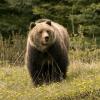 A CU researcher argues setting minimum targets for wildlife conservation inevitably excludes other worthwhile goals, including restoration and ecosystem management.
A CU researcher argues setting minimum targets for wildlife conservation inevitably excludes other worthwhile goals, including restoration and ecosystem management. Khosro Ghobadi-Far is advancing the science of climate change with orbiting satellites through an $800,000 NASA grant.
Khosro Ghobadi-Far is advancing the science of climate change with orbiting satellites through an $800,000 NASA grant.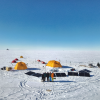 An engineer, a graduate student and three research scientists are in Greenland braving extreme cold and blustery winds as they install 25 instruments to observe changes in the ice sheet-atmosphere system during the summer melt season.
An engineer, a graduate student and three research scientists are in Greenland braving extreme cold and blustery winds as they install 25 instruments to observe changes in the ice sheet-atmosphere system during the summer melt season.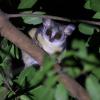 Researchers led by CU Boulder primatologist Michelle Sauther walked the paths of the Lajuma Research Centre in South Africa at night, keeping an eye out for the glowing eyes of galago primates, or bushbabies. The team's findings reveal troubling hints about how small animals may adapt to extreme temperatures.
Researchers led by CU Boulder primatologist Michelle Sauther walked the paths of the Lajuma Research Centre in South Africa at night, keeping an eye out for the glowing eyes of galago primates, or bushbabies. The team's findings reveal troubling hints about how small animals may adapt to extreme temperatures.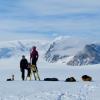 For the first time in the field, CIRES-led research shows that ice shelves don’t just buckle under the weight of meltwater lakes—they fracture.
For the first time in the field, CIRES-led research shows that ice shelves don’t just buckle under the weight of meltwater lakes—they fracture. The Colorado River’s future may be a little brighter than expected, according to a new modeling study from CIRES researchers. Warming temperatures have raised doubts the river could recover. But the new study paints a fuller picture.
The Colorado River’s future may be a little brighter than expected, according to a new modeling study from CIRES researchers. Warming temperatures have raised doubts the river could recover. But the new study paints a fuller picture.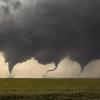 In the past few weeks, multiple tornadoes have wreaked havoc in the central and southern U.S. Atmospheric scientist Andrew Winters says more may be on the way and offers tips to stay safe.
In the past few weeks, multiple tornadoes have wreaked havoc in the central and southern U.S. Atmospheric scientist Andrew Winters says more may be on the way and offers tips to stay safe.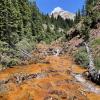 Warming temperatures are causing a steady rise in copper, zinc and sulfate in the waters of Colorado mountain streams affected by acid rock drainage. Concentrations of these metals have roughly doubled over the past 30 years, a new study finds, presenting a concern for ecosystems, downstream water quality and mining remediation.
Warming temperatures are causing a steady rise in copper, zinc and sulfate in the waters of Colorado mountain streams affected by acid rock drainage. Concentrations of these metals have roughly doubled over the past 30 years, a new study finds, presenting a concern for ecosystems, downstream water quality and mining remediation.
 Proposed wind farms off the East Coast could meet 60% of the electricity demand of New England, even considering the wake effects, a new study shows.
Proposed wind farms off the East Coast could meet 60% of the electricity demand of New England, even considering the wake effects, a new study shows.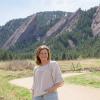 A researcher’s experience in advertising, marketing and public relations gives her a unique angle to study organizational communications and policy around climate impact and awareness.
A researcher’s experience in advertising, marketing and public relations gives her a unique angle to study organizational communications and policy around climate impact and awareness.


